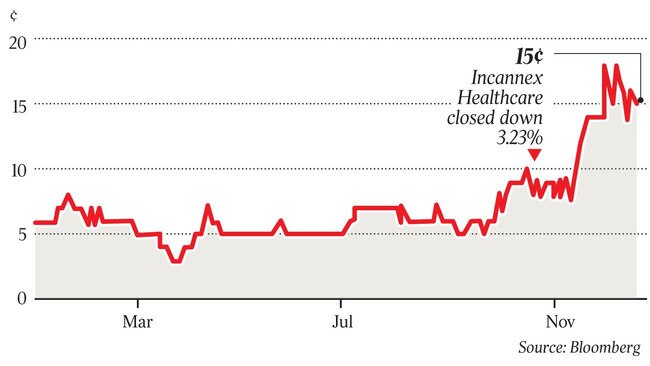Incannex launches mental health trial with magic mushrooms and Monash University
A team of Australian researchers want to reclaim psychedelics in medicine to treat mental health disorders.

What goes around comes around, and in the case of magic mushrooms it has taken more than half a century for them to be considered a viable treatment again for a range of anxiety disorders.
Psychedelics — a term coined by a group of pioneering psychiatrists in the 1950s before it was usurped by flower power a decade later and eventually banned by former US President Richard Nixon — is seeking to reclaim its origins thanks to an ASX-listed company and leading Australian university.
Incannex, known for producing medicinal cannabis products, has teamed up with Monash University researchers to launch Australia’s biggest psychedelic research and development project to help treat generalised anxiety disorder.
The project will involve the production of synthetic magic mushrooms, or psilocybin — no foraging in dense forests or in cow dung — and the recruitment of at least 72 patients.
The trial will be delivered within BrainPark, Monash University’s neuroscience research clinic, and will be compliant with the US Food and Drug Administrations regulations.
It comes as demand for mental health services soared during the Covid-19 pandemic, with the Morrison government injecting an extra $12m in August to ensure people could access digital and telephone counselling services around the clock.
Frustrated field
The project’s chief principal investigator Paul Liknaitzky said psychiatry had been a “frustrated field”, making almost no progress in the past 20 years, despite sharp increases in mental health conditions. Generalised anxiety disorder is a common disorder with about 6-9 per cent lifetime prevalence, and about 3 per cent 12-month prevalence in countries including Australia and the US.
But Dr Liknaitzky said the psychedelic trial could be “the next big thing in psychiatry”. He said recent research indicated that psilocybin-assisted psychotherapy may be an effective treatment for major depressive disorder, depression and anxiety associated with terminal illness, alcohol use disorder, smoking addiction, and other conditions.
“This (psychedelics) was the next big thing in psychiatry in the 1950s and 1960s and after a period of quite a few decades in the deep freeze, we are now seeing that this appears that this seems to be the next big thing in psychiatry once again,” Dr Liknaitzky told The Australian.
“Certainly the field has been mired by what was largely a political manoeuvre from Nixon’s administration in the late ’60s and leading to the psychotropic act in the 1970s, which almost every country in the world signed onto through international treaties. At the time, psychedelics were scheduled in the most prohibitive way alongside heroin and crack cocaine.

Almost no abuse potential
“But there was already 15 years’ worth of evidence to indicate there were multiple therapeutic utilities across numerous indications and that classical psychedelics have a very low risk profile … with almost no abuse potential and dependence. When you look at the definition of a Schedule 1 drug in the US, those compounds are defined as substances with no medical potential with high abuse potential. That was clearly a falsehood that was propagated by Nixon alongside a whole propaganda campaign that we are unfortunately still in the long shadow of.”
But Dr Liknaitzky said the tide was beginning to turn, and it couldn’t come at a better time as restrictions aimed at limiting the spread of Covid-19 has stretched mental health services.
“What was required was something of a generational shift where the propaganda and stigma associated with these substances could be reduced and it’s clear that we simply can’t ignore the evidence, and the evidence is incredibly promising, as it was in the first wave of psychedelic research through the ’50s and ’60s.
“The field of psychiatry is anomalist in medicine. If you look at any other branch of medicine over the past 50 years the development has been impressive whereas psychiatry has unfortunately been a frustrated field, with very little progress over the past 50 years and almost no progress over the past 20 years.
Increasing mental illness
“Unfortunately, we still see that in spite of the best minds on the planet, and many tens of thousands of them working full time on the problems of mental illness, the curve is still going in the wrong direction. We still see an increase in prevalence across all mental health indications and certainly situations like the Covid-19 pandemic do not help.”
The clinical trial will involve psilocybin dosing sessions alongside a program of specialised psychotherapy. Dr Liknaitzky said the treatment will be facilitated by “experienced and qualified clinicians who have undergone substantive training in psilocybin-assisted psychotherapy”.
“I’m confident that we will conduct a highly rigorous, patient-focused, world-class trial to assess the safety and efficacy of this treatment approach for people dealing with severe anxiety. Given the early yet highly promising results from other psilocybin trials for different conditions, this treatment – alongside innovations we will develop – may deliver a substantial step forward in the treatment of anxiety disorders.”
Incannex managing director and chief executive Joel Latham said the aim or the project was to build a research program that has “independence and rigour”.
It is hoped that the clinical trial will be completed within two years. Mr Latham said InCannex would work with the FDA and seek expedited approval if the trial is successful, “significantly reducing the time to market”.
“We will be driven by the guidance by the FDA as we continue with the program,” Mr Latham said.
“The market opportunity is endless. There is a significant unmet need and similar to other programs where we are targeting multi-billion dollar markets.
“We are looking to develop this program to potentially help a large number of patients out there that are suffering from these conditions that can’t find treatment options that can adequately meet their needs.”




To join the conversation, please log in. Don't have an account? Register
Join the conversation, you are commenting as Logout